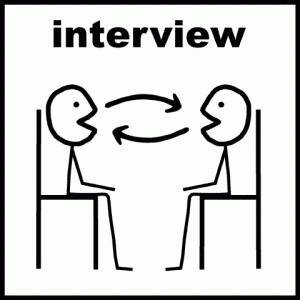 The main goal of most interviews is to create an informational product. This is one of the most common ways of gathering information, and it is used by journalists. The method of interviewing is also often used in interpersonal communication outside media, such as with employment. However, any type of job interview has its own peculiarities.
The main goal of most interviews is to create an informational product. This is one of the most common ways of gathering information, and it is used by journalists. The method of interviewing is also often used in interpersonal communication outside media, such as with employment. However, any type of job interview has its own peculiarities.

✅ AI Essay Writer ✅ AI Detector ✅ Plagchecker ✅ Paraphraser
✅ Summarizer ✅ Citation Generator
Steps for Preparing an Interview
- Choose a person you want to interview. In most cases, information on famous people is available via the Internet and other means, so before thinking of questions, you should first learn what you can about the person’s professional and private life, including any significant milestones, if possible.
- Decide on the topic you want to discuss with the person you’ve chosen to interview. Keep in mind that in order to prepare a successful interview, both you and your interviewee should be competent on the interview subject. Therefore, make sure you know enough about the topic. Do additional research, if needed.
- Get the person’s permission to do the interview. If you work as a journalist, it will be much easier for you to get permission, since your organization will most likely conduct the necessary negotiations.
- Prepare a list of questions. Remember to limit your time and mind the number of questions asked, as well as the time needed for your interviewee to answer each of them. Don’t dig into details. Leave it directly for the interview, when you can evaluate the situation and decide whether these details are needed.
- Conduct the interview. Be polite and patient. Don’t interrupt your respondent and don’t twist the meaning of their words. However, don’t let them take the full initiative, since you need to follow the questionnaire you’ve composed.
Topic Selection
Interviews are most interesting when they refer to burning issues or are conducted by a renowned personality. Therefore, an interviewer should be aware of the latest events, although in some cases, topics may be preassigned. For example, one could be assigned to interview a famous politician, an expert in a certain field to clarify a certain situation, a celebrity who has become famous due to starring in a new blockbuster, a singer, an artist, or a theatrical actor.
Key Points to Consider
- Though there are many ways to conduct an interview, basically two main modes of conversation can be distinguished: confrontational and affiliate. In confrontational mode, which is better suited for news agencies, the interviewer often asks the interviewee some provocative questions and the journalist seeks to gather information and dig for the truth. On the other hand, the affiliate mode presumes the development of new knowledge through dialogue and cooperation of both the interviewer and the interviewee, instead of implied opposition.
- An interview can pursue different goals. It may be aimed at gathering information for news releases, or investigating crimes, financial frauds, and other cases. It also may be a portrait of a famous person or a free-flowing, spontaneous dialogue in general.
- The interview doesn’t necessarily need to be taken in private. With the help of modern means of communication, an interview can be taken via email, phone, forums, chats, Skype, and so on.
- The progress of the interview may depend on the style of communication you’ve chosen. Depending on whether you start the conversation with “Good evening, Michael,” or “Hi, Mike!” you may have a different outcome, since formal and informal communication have their own peculiarities.
Do and Don’t
Do
|
Don’t
|
Common Mistakes When Preparing an Interview
– Being too informal or too official. You shouldn’t stick to one model of conversation and adhere to it no matter what. This will, most likely, make your interviews predictable. Depending on the situation, the topic, or the person you interview, you can choose whether to be formal or informal.
– Digging into one question and forgetting about other ones.
– Trying to elicit personal information without prior consent.
– Trying to lead an impromptu conversation or, on the contrary, sticking to a questionnaire without letting yourself digress a bit.
Follow us on Reddit for more insights and updates.


Comments (0)
Welcome to A*Help comments!
We’re all about debate and discussion at A*Help.
We value the diverse opinions of users, so you may find points of view that you don’t agree with. And that’s cool. However, there are certain things we’re not OK with: attempts to manipulate our data in any way, for example, or the posting of discriminative, offensive, hateful, or disparaging material.